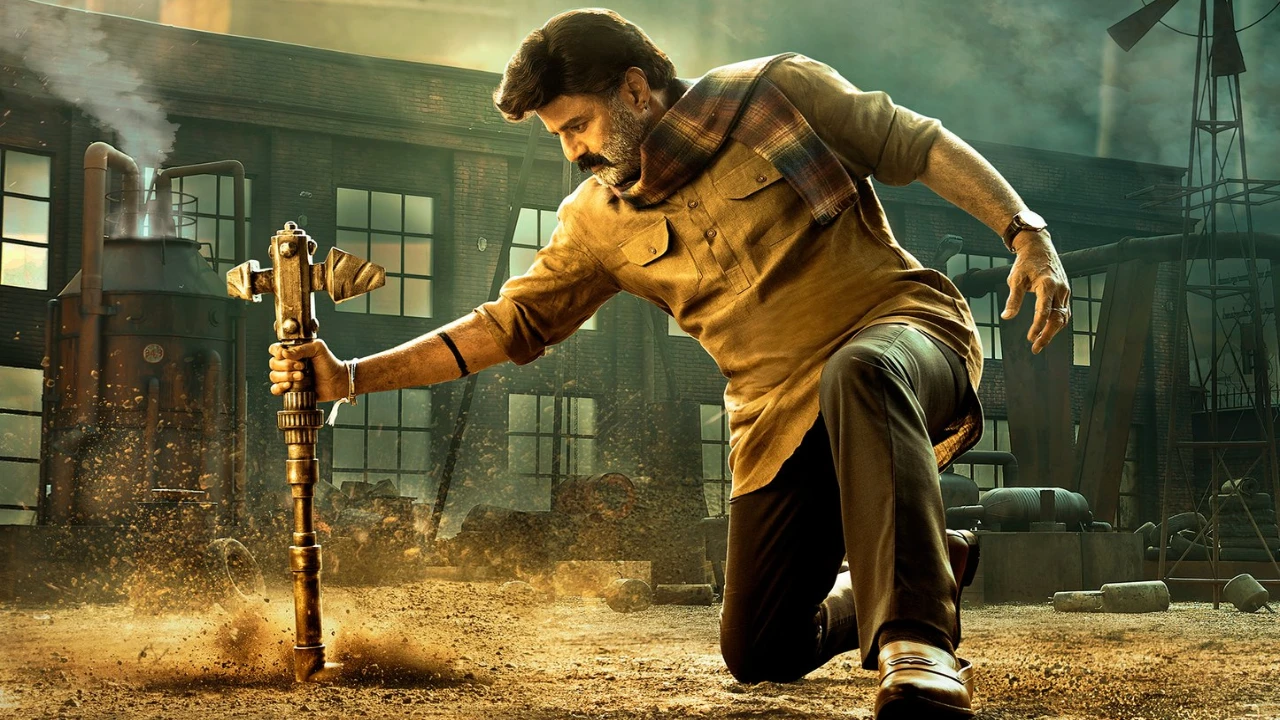Telugu Movie Review: Kalki 2898 AD impresses visually, but struggles to develop storytelling momentum

Hollywood industry observers have widely noted the significant absence of a traditional sci-fi/fantasy spectacle to kick off this year’s strike-depleted summer movie season; Kingdom of the Planet of the Apes and Furiosa: A Mad Max Saga are the closest you’ll get, and a far cry from Marvel-style escapism. It seems only fitting that the increasingly competitive-minded Indian film industry would have an answer for this drought in Kalki 2898 AD. The film, one of the biggest in Tollywood history, is not only a lore-packed fantasy of epic proportions, but one on track to set numerous box office records both in India and abroad this coming weekend. Now, don’t expect non-Indian audiences in the West to flock to this in droves – its mythology is perhaps a bit too culturally-specific for real crossover potential – but the diaspora alone may propel Kalki 2898 AD into the Top 5 at this weekend’s North American box office.
The above may read like an excessive amount of money talk and industry analysis for a piece intending to be a movie review, but I think it’s important to establish upfront the kind of tentpole that Kalki 2898 AD is aspiring to be. During the first 45 minutes of the film especially, it’s very clear that writer/director Nag Ashwin is aiming for a Marvel-type universe, no matter how steeped in Indian texts like the Mahabharata the story is. The style and construction of the movie feel very Hollywood, which makes its commercial ambitions inextricable from its artistic aims. I will be curious if one of the main criticisms among Indian viewers is that it all feels a bit too Hollywood, even if they’re enthralled by the extreme lengths the film goes for fan service (including more star cameos in a single film than I’ve seen since the third Austin Powers). All of this is to say, the way Ashwin goes about world-building suggests he’d like the picture to be viewed on the same plane as any of the biggest international blockbusters out there.
Telugu Movie Review: Naa Saami Ranga is an electric cocktail of family and village drama, propelled by Nagarjuna’s charisma

Shakespearean family drama abound in Naa Saami Ranga, though that’s not to say the film ever becomes unbearably tragic. Don’t get me wrong, there are some incredibly intense plot developments, as well as some devastating fates that characters would certainly have preferred not to have suffered. But at its essence, this is an energetic, pleasurable spectacle – a play on Shakespearean character dynamics that doesn’t necessarily carry the same tone over. It’s very early in the year yet, but for now, Naa Saami Ranga stands out as the most consistently entertaining attempt at a “mass appeal” film in 2024.
The directorial debut of longtime choreographer Vijay Binni, the film is brimming with musicality – and not just in the solid song-and-dance numbers. Even the most dialogue-heavy scenes carry a certain propulsive energy to them, which feels like a direct byproduct of Binni’s extensive experience in staging and presenting Tollywood stars. Sometimes, a movie just feels and moves differently than most of the other films in the marketplace, and it’s hard to put your finger on exactly why. Na Saami Ranga fits this description, and the credit goes to Binni.
Telugu Movie Review: Saindhav is watchable in spite of its gangster cliches, thanks entirely to lead Venkatesh

Saindhav is an amalgamation of a lot of the major tropes in today’s Telugu cinema: a reformed hero with a dark past, a close-knit father and young daughter mourning the loss of Mom, an unstable gangster underworld brimming with power struggles, a backdrop of global terrorist threats. For the most part, the movie doesn’t even try to elegantly weave all of these disparate elements together; it combines them in as easy and efficient a manner as it possibly can. The script is lazy, and much of the finished film’s construction is as well. But Venkatesh is so good at selling this sloppily-written mess in his lead performance that – at least for a while – the movie holds together well enough to keep the audience’s attention.
In his prior life as a gangster henchman, our hero used to be called “SaiKo,” as in psycho – an early “reveal” that the movie initially seems to be protecting, despite it being patently obvious that the name Saindhav Koneru would be cleverly abbreviated in this way. Saindhav swore off his life of crime around the time of his wife’s death, which has left him raising their young daughter Gayathri (played by Ssara Palekar) as a single dad. He’s now a humble crane operator at the local port. But Saindhav’s past can’t help but come back to haunt him, as two tragedies simultaneously unfold. First, Saindhav’s past associates begin supplying local kids with weapons, recruiting them for terrorist groups, crossing a redline he had set when he left the organization. Second, Gayathri is diagnosed with the rare disease SMA (spinal muscular atrophy), requiring a life-saving injection that costs ₹17 crores, an exorbitant sum that no simple crane operator could ever afford.
Telugu Movie Review: Hanu Man offers a winning superhero saga for kids, but it’s a less compelling choice for adults

Every so often, I encounter a new movie that I wish I could show my 8-year-old self. Hanu Man is the latest example. The boy who ate up juvenile fare like 1995’s Mighty Morphin Power Rangers: The Movie and 1998’s Godzilla would have absolutely adored this light-as-a-feather superhero origin story, even as his reading level likely would have made the subtitles a challenge. At 34, I wasn’t immune to Hanu Man’s playful charms, but I could only invest so much in an odyssey this simple and silly. If you have kids ages 7-12 who are up for a Telugu language adventure, it’s a must-see for the family; others may develop that sinking “this just isn’t made for me” feeling as the movie progresses.
The best family films, of course, are able to drive equal levels of investment among parents and kids, simultaneously speaking to both on their own unique levels. This requires an unassumingly high amount of filmmaking skill. Hanu Man is not one of these movies; it builds a logic-defying world that only those without fully-developed frontal lobes will be able to fully immerse themselves in. You’re bound to approach the movie from a certain distance if you’ve already made it into adolescence; its childishness is readily apparent early on, though not until after a pretty audacious prologue sequence. Granted, Hanu Man should still strike adults as a likable and amiable piece of family-friendly filmmaking, but perhaps better as a babysitter than as a personal source of entertainment.
Telugu Movie Review: Mahesh earns his paycheck in the otherwise underwhelming Guntur Kaaram

Moviegoers who buy a ticket to Guntur Kaaram chiefly because they are fans of Mahesh Babu will get what they paid for, if not much more. The star is effortlessly charismatic in the lead role of Veera Venkata Ramana, the long-disowned son of a political dynasty whose childhood trauma turned him into a delightful smartass of an adult. The film chiefly focuses on Ramana’s (ex-)family’s attempt to get him to sign a contract formally disassociating from them, which is tied to shifty political maneuvering by his grandfather Venkata Swamy (Prakash Raj) as his mother Vasundhara (Ramya Krishnan), who walked out on Ramana as a child, is appointed as an MP. With a different lead actor, this story could have quickly descended into a cut-rate Shakespearean soap opera, but Mahesh approaches his character with such a light touch that his antics in resisting the contract are always fun and often very funny. Especially in the first half, it’s a pleasure to watch Ramana evade the signing process, even though it gets repetitive.
Not only is Mahesh charming and funny in the role, he’s also more than capable as both a dancer and an action hero, even though the film overall comes up a bit short in both departments. The fact that Guntur Kaaram marks Mahesh’s reunion with writer/director Trivikram Srinivas – their third collaboration together, coming 13 years after their last (Khaleja) – is certainly being hyped up by the press and the film’s publicity campaign. But it would be hard to argue that Trivikram provides his film nearly the same amount of juice that Mahesh does. Not only is the movie’s story itself something of a disappointment – we’ll get into that in just a moment – but the filmmaking feels pretty lazy. The action set-pieces are only memorable because of Mahesh’s swagger as the fun-but-still-menacing-enough Ramana, not because of any editing or staging choices, all of which feel very dated. The same goes for the musical numbers, which would be total snoozes if not for the raw energy of Mahesh and romantic co-star Sreeleela, who can seemingly thrust her hips faster than any other living human.
Telugu Movie Review: Devil is a watchable, but entirely unoriginal British-Indian spy thriller

Devil is such a transparent hybridization of James Bond and RRR that I’d be stunned if there wasn’t a point (or more likely, many points) in the project’s development where it was pitched exactly as such. If screenwriter Srikanth Vissa was even remotely trying to hide these “influences” in the script, his efforts were entirely destroyed by producer/director Abhishek Nama, who seems to seize every opportunity he can to remind the viewer of them. (Nama reportedly took over directing duties from Naveen Medaram after 105 days of shooting over “creative differences,” and one must wonder if this was part of the issue.) The nonstop nods begin with the opening titles, which are such a shameless, poor man’s rip-off of a Bond introduction, it verges on adorable. I practically expected to hear a Telugu language version of Adele’s “Skyfall.” That’s the thing about Devil: for as completely lacking in originality as the film is, it’s endearing in the same way that many ’90s straight-to-video imposters once were.
Like James Bond, our hero – codename Devil – is a secret agent working for the British government. He’s Indian by nationality, but this is 1945, and Devil has sworn to protect the British Raj. We don’t know too much more about him or his background, beyond the fact that he is clearly capable of singlehandedly taking down other men by the dozen, as we watch him go about comfortably in an early action set-piece aboard a ship being raided by pirates. Lead actor Nandamuri Kalyan Ram’s performance seems to thrive upon the expository deficit when it comes to Devil’s character; he’s content to play him as rather generically suave and smooth when he isn’t showing off an investigative attention-to-detail that rivals those of Poirot and Benoit Blanc.
Telugu Movie Review: Salaar: Part 1 – Ceasefire may only be half a story, but it still feels like the most massive epic of the year

It’s been a long time since I’ve felt as utterly exhausted by a film as I was by Salaar: Part 1 – Ceasefire, which crams what seems like multiple Greek tragedies worth of material into just under three hours. And yet, despite the sheer volume of characters and story involved in the movie, it’s still basically all just exposition laying the groundwork for Part 2, which is currently in production and aiming for a release next year. Not only that, but even after this amount of setup, there remain a great number of mysteries left to be unraveled in Part 2, including how a few key characters in Part 1 connect to the main story being told in the first place. The utter enormity of what is being attempted in this saga is daunting, though at this point, one would expect no less from writer/director Prashant Neel, the mastermind behind the K.G.F. films.
For as much of an endurance test as this mythology-heavy movie is, I don’t want to imply that it is in any way joyless or a slog. Neel and the cast do a very good job of getting the viewer invested right from the outset, so that there is no temptation to give up on the mysteries of the story before the answers are finally revealed. From the very first sequence, where we meet main characters Deva and Vardha as children in a rousing moment of public uproar that will have ramifications for the rest of their lives, I “bought in” due to the sheer intensity of emotion evoked. That intensity is largely maintained after we fast-forward a couple decades and meet Aadhya (Shruti Hassan), whose life ties into Deva and Vardha’s saga in enigmatic ways that land her in mortal danger upon returning to her family’s homeland of India.
Aadhya’s story intersects with that of an adult Deva (“Rebel Star” Prabhas), who has already been established as the hero of this saga as a child, with the royal-blooded Vardha dubbing him “Salaar” (a name that means “leader, chief, or commander”). Living as an outcast in a remote area of India with his mother (Easwari Rao), it’s immediately apparent that Deva will play a key role in protecting Aadhya’s life – and not simply because he’s played by the effortlessly magnetic and heroic-seeming Prabhas. Equally apparent is that this undertaking is going to serve as an epic, violent referendum on the past. As a child, Deva vowed to always protect Vardha, which, needless to say, has not resulted in an easy life given the conflicts surrounding Vardha’s royal family.
Telugu Movie Review: Extra Ordinary Man dares to be so utterly absurd, it’s kind of irresistible

There have been a good number of aggressively, almost mind-bogglingly silly Telugu comedies this year, with Kushi and Rules Ranjann serving as prime examples. Many critics and regular moviegoers alike have commented that Extra Ordinary Man is perhaps the most relentlessly stupid and outdated of them all, and I have no real rebuttal. At times, even applying the loosest standards for comedy, the movie is so ridiculous that it’s downright hard to believe somebody actually financed it and gave it a worldwide release. But something about the film’s manic energy and notable lack of a hard pivot to phony pathos in the third act – which was Kushi’s big undoing – endeared me to it in a major way. Imagine if Ace Ventura and Bowfinger had a Telugu-speaking baby, and you can begin to understand the complete madness that Extra Ordinary Man is dishing out. Sometimes, one just has to admire the sheer audacity of a film’s existence.
It’s hard to capture the frantic comedic spirit of Extra Ordinary Man in writing, but a straight-ahead plot summary is a good place to start. Abhinav (played by Nithiin) is a background actor who’s always in search of a big-break, leading-man role that’s never coming. But he somehow still stumbles into the prospect of unimaginable wealth when he uses his acting skills to help a more-than-tipsy businesswoman named Likitha (Sreeleela) out of a sticky situation at a drunk driving checkpoint (yes, really). Abhinav’s invaluable (read: clueless) assistance soon leads Likitha to make him both the CEO of her company and her boyfriend (again, yes, really). The only problem is: shortly thereafter, he’s asked to take the hero role in an old filmmaker friend’s new detective-versus-gangster movie, requiring him to bail on his burgeoning corporate career. Tragically, Abhinav accepts the role only to be dumped before shooting begins, leaving him once again both jobless and womanless, with nothing to show for himself. The fun is only just getting started, however, as a drunken and dejected Abhinav wanders into a new village only to realize that his life has literally become that of the film role he was just removed from.
Telugu Movie Review: Bhagavanth Kesari is just too formulaic to be redeemed by an engaging relationship between likable leads

At the heart of Bhagavanth Kesari is a tender relationship that really works. The title character, played by Balakrishna, is an adoptive father to Vijayalakshmi “Viji” (played by Sreeleela), the blood daughter of the deceased jailer who set him free. As Viji enters young adulthood, her bond with Bhagavanth – the man who has raised her for over a decade to be strong and independent – remains tighter than most between parents and children her age. But they are distanced by a longstanding disagreement: Bhagavanth wants Viji to enter the Army – something her late father requested, inspired by her late mother – but Viji’s past traumas won’t let her go down that road. Racked with anxiety, she feels that marrying her boyfriend, Karthik (Rahul Ravi), may be the better path. Bhagavanth has other plans.
If it seems like this dynamic is setting the stage for some broad, preachy themes of female empowerment, you’d be correct. Bhagavanth Kesari definitely spares no opportunity to convince the viewer of its feminist credentials, while not offering much of anything new in this department. But even in spite of the rather exaggerated nature of this messaging, both the humorous rapport and emotional moments between Bhagavanth and Viji ring true to a real father-daughter relationship, warts and all. Credit must go to both actors in developing this makeshift familial bond with seeming effortlessness: Balakrishna (widely commended for playing a character his age here) and Sreeleela feel unforced and natural together, both in terms of the love between their characters and their rift about Viji’s future.
Telugu Movie Review: Rules Ranjann is an aggressively silly rom-com

I hung in with Rules Ranjann for longer than it deserved my goodwill. There is something so off-the-wall and silly about the movie’s presentation that an open viewer has no choice but to play along at first. Especially due to what appears to be a topical setting/subject matter – a naïve tech worker trying to navigate his way up the corporate latter – I figured it had to be aiming for exaggerated satire. Tired of abuse from his Hindi-speaking colleagues in Mumbai, Tirupati transplant Mano Ranjann (Kiran Abbavaram) makes a power-play to reign over the entire office – his boss (Annu Kapoor) included – as a sort of makeshift dictator. He’s the first in and the last out, and nothing will escape his watchful eye, leading him to be known as Rules Ranjann.
In what initially feels like an exaggerated allegory on today’s crumbling social standards in both the workplace and off-the-clock, Ranjann’s control-freak nature seeps outside his 9-to-5 and into his (uneventful) personal life. Mercifully, Tollywood’s penchant for original music and likely a lacking budget spare us the needle drop of Dua Lipa’s “New Rules” that would have been inevitable in a Hollywood version of this story. But there’s still plenty of the track’s salacious spirit on display. A questionable co-director of B-grade films (played by Vennela Kishore) moves in across the hall from Ranjann, bringing with him a new lay every night, undoubtedly luring them with the promise of a future starring role in one of his movies. Ranjann has no tolerance for this scandalous behavior, so he does what any aggrieved neighbor would do: finds a way to get his new hallmate kicked to the curb.

